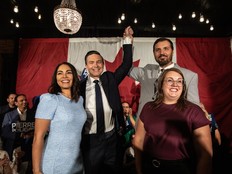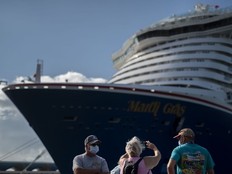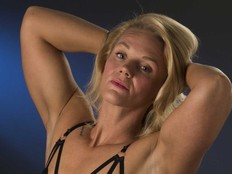Trump movie tariff plan steals spotlight at Cannes Film Festival

Article content
Reviews and recommendations are unbiased and products are independently selected. Postmedia may earn an affiliate commission from purchases made through links on this page.
(Bloomberg) — The Hungarian film institute’s booth at the Cannes Film Festival has a glossy brochure promoting a studio complex on the outskirts of Budapest. Next to a mock medieval village, it has a cluster of wood-paneled houses described as an “American suburb.” The set has been used to shoot US productions like Universal’s 2022 horror comedy The Munsters at a fraction of what it would cost to make in Hollywood.
Hungary, like many other countries, has built up its film industry using tax breaks that have lured big-budget American productions. But that business model has been thrown into question after President Donald Trump announced plans this month to impose a “100% tariff” on films shot outside of the US. Netflix Inc. and Walt Disney Co. shares tumbled in fear of rising production costs, and executives called on the White House to increase federal incentives instead.
The proposal was the talk of Cannes’ Film Market, where 15,000 movie professionals jostle in a vast, underground conference space to get deals done. Away from the red carpet, representatives from dozens of countries occupy booths to advertise government incentives to attract filmmakers, using Cannes to find financing and distributors, as well as locations and soundstages.
Many attendees were perplexed by the potential impact of any such tariffs. Movies are often international efforts, co-produced in many countries, so it’s not clear how the tariff would be applied. A quintessential Hollywood blockbuster like Mission: Impossible — The Final Reckoning, which premiered at Cannes, was shot in the UK, South Africa, Norway and Malta.
“Can you hold up the movie in customs?” US director Wes Anderson asked at a press conference for his film The Phoenician Scheme, shot in Germany. “I feel it doesn’t ship that way.”
Robert De Niro had a similar take.
“You can’t put a price on creativity, but apparently you can put a tariff on it,” the actor said in a speech when he received an honorary Palme d’Or. “Of course, this is unacceptable.”
Among national representatives at the Film Market, where countries shop tax breaks and incentives to lure big-budget films, there was concern about how much of an impact Trump’s policy would have. But it didn’t stop them from pitching to American productions.
“Whatever the new US policy is, it is going to affect us, but we wait to see,” said Marysela Zamora, the film commissioner for Costa Rica, in a booth adorned with lush jungle photos. The country now offers a new 90% VAT refund to production companies that spend at least $500,000, which has helped triple money spent shooting in the country, Zamora said. ABC’s reality TV show Bachelor in Paradise recently shifted its production to the Central American country from Mexico.
At Hungary’s booth, a representative said Trump’s comments came as a surprise. The central European country offers filmmakers a 30% cash rebate, high-tech sets and a skilled workforce, making it an attractive option for big productions looking to lower costs. Paramount+ series NCIS and Apple feature film Matchbox, starring John Cena, are currently being shot in the country. Later this year, parts of Dune 3: Messiah will be filmed there.
The impact of any tariffs on the film industry won’t be felt immediately, and Hungary’s facilities are still at full capacity, Csaba Káel, the country’s commissioner, said in a statement.
At the entrance to the Film Market, Morocco paid for an ad wall touting a 30% tax rebate “with no cap,” showing a photo of the ancient town of Aït Benhaddou that served as a backdrop to Gladiator and Game of Thrones. On a column in the convention center, Invest India advertised tax incentives of as much as 40% for projects that spend $3 million locally. Saudi Arabia used a big waterfront tent to unveil plans for a sprawling production complex in Riyadh.
There were also newer entrants trying to put themselves on the map. Iraqi Kurdistan took a not-too-busy stand near the entrance to launch its film commission, inviting filmmakers to shoot in the region as a “stand-in for various countries,” including Iran, Afghanistan and Syria.
A few steps on, a large white tent facing the Mediterranean sea housed the American pavilion, where guests enjoyed iced drinks and quesadillas on a terrace. There, Colleen Bell, executive director of the California Film Commission, acknowledged that the US has experienced “some runaway of production” as other markets became more competitive.
RECOMMENDED VIDEO
The main recipe to “put Californians back to doing the work they love” is Governor Gavin Newsom’s plan to expand tax credits to the film and movie industry, Bell said. She declined to comment on Trump’s tariff idea. During a “California Day” at the venue, representatives from the Los Angeles tourism board said the city has a variety of stunning locations that could stand in for Miami, or even Hungary.
“The problem is when Hungary can look like Los Angeles,” replied IndieWire Editor-in-Chief Dana Harris-Bridson.











Postmedia is committed to maintaining a lively but civil forum for discussion. Please keep comments relevant and respectful. Comments may take up to an hour to appear on the site. You will receive an email if there is a reply to your comment, an update to a thread you follow or if a user you follow comments. Visit our Community Guidelines for more information.